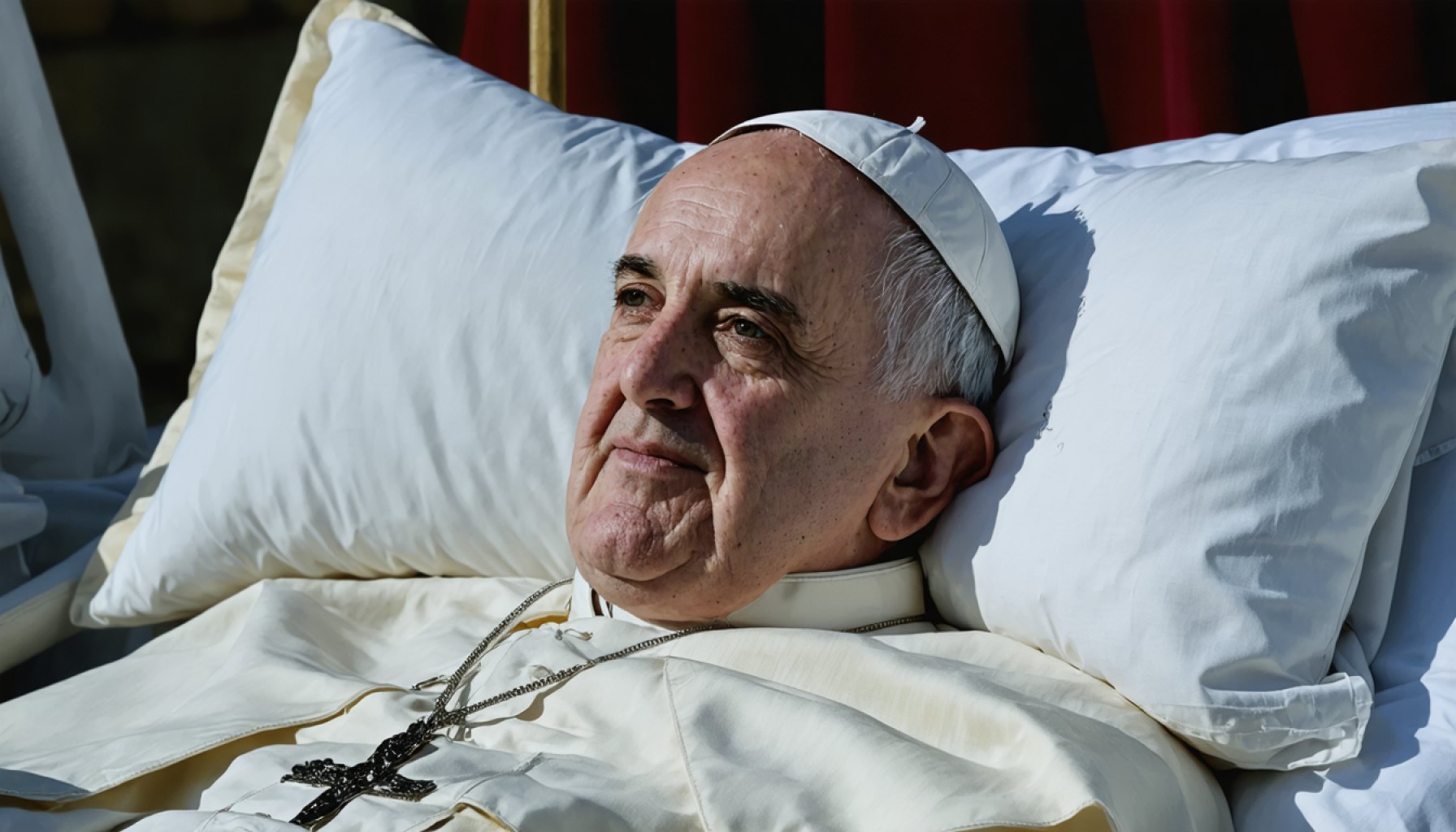- Pope Francis is currently hospitalized in Rome with pneumonia, initially diagnosed as bronchitis.
- A CT scan on the 18th revealed a complex lung infection, necessitating rigorous treatment with antibiotics.
- The Pope’s expected brief hospital stay, starting on the 14th, was extended due to a multi-bacterial infection.
- Amidst treatment, Pope Francis remains engaged in prayer and scripture reading, maintaining his spiritual resilience.
- The Vatican confirms his condition as stable, highlighting his strength and hope in adversity.
- Pope Francis’s journey underscores the notion that resilience can emerge from vulnerability, inspiring millions worldwide.
Amid the hallowed halls of the Vatican, a somber hush settles. Pope Francis, a beacon of hope for millions, found himself in the confines of a Roman hospital room. Struck initially with bronchitis, his condition intensified into pneumonia, casting a shadow over the Holy See.
On the afternoon of the 18th, a CT scan revealed the brewing storm within his lungs. The medical team, steadfast and precise, concluded that his situation demanded a more rigorous treatment regimen. The antibiotics, long accustomed to battling lesser ailments, now faced the formidable challenge of a complex infection.
Originally, a brief hospital stay was anticipated when he was admitted on the 14th. However, the revelation of a multi-bacterial infection reshaped expectations, requiring continuous and careful supervision.
Within the hospital’s muted walls, the Pope remains grounded. His days are woven with moments of prayer, scripture readings, and rest—simple acts that anchor his spirit amidst uncertainty. The Vatican assures that his condition is stable, yet the pontiff’s tenacity in the face of adversity is apparent.
The broader takeaway whispers through this turbulent time: in vulnerability lies resilience. Pope Francis exemplifies this as he battles his illness, embodying the strength and hope that continue to inspire the faithful across the globe. His resolve illustrates that even in the heart of fragility, there is profound fortitude.
Pope Francis’ Timely Recovery: Exploring the Impact and Implications
How-To Steps & Life Hacks: Caring for Respiratory Illnesses
1. Seek Medical Attention Early: Identifying symptoms like persistent cough or shortness of breath can prompt timely medical intervention, as seen in Pope Francis’s case.
2. Follow a Medication Regimen: Adhering strictly to prescribed antibiotics is crucial to manage infections effectively.
3. Engage in Restorative Practices: Incorporate rest, prayer, or meditation to support mental and spiritual well-being during illness.
4. Nutritional Support: Consume a balanced diet to strengthen the immune system.
5. Avoid Exposure: Stay away from crowded places to prevent further infections, especially with compromised immunity.
Real-World Use Cases: Leadership During Illness
– Crisis Management: Organizations often reassess roles and develop contingency plans when a pivotal leader, such as the Pope, is incapacitated.
– Public Relations: Maintaining transparent communication reassures stakeholders and mitigates misinformation.
– Spiritual Resilience: Religious and spiritual leaders continue to inspire even when battling personal challenges, highlighting their role beyond ceremonial duties.
Market Forecasts & Industry Trends: Healthcare Innovations
– Antibiotic Development: The increased need for complex antibiotics against resistant infections signals a booming pharmaceutical focus on research and development.
– Telemedicine Integration: Hospitals may integrate telemedicine for non-critical consultations, preserving hospital resources for acute cases.
– Global Health Diplomacy: Through organizations like the World Health Organization, there’s a push for increased cooperation in managing transnational health issues.
Reviews & Comparisons: Medical Facilities & Treatment Protocols
Comparative reviews of global healthcare systems often highlight:
– Italy’s Healthcare System: Known for universal coverage, yet facing challenges like resource allocation, Italy’s coordination in complex medical cases is noteworthy.
– Vatican Healthcare Services: Though limited, the personal care provided to Vatican officials reflects a unique integration of spirituality and health.
Controversies & Limitations: Addressing Resistance
– Antibiotic Overuse: Rising concerns about antibiotic resistance prompt discussions on prescription practices.
– Privacy in Health: Balancing public interest and personal privacy remains a delicate act, especially for public figures.
Features, Specs & Pricing: Hospital Equipment and Facilities
– Advanced Imaging: CT scans are pivotal for detailed diagnostics, crucial in cases similar to the Pope’s condition.
– Infection Control Protocols: Hospitals emphasize stringent protocols to prevent nosocomial infections.
Security & Sustainability: Innovations in Healthcare
– Data Security: Implement robust cybersecurity measures to protect sensitive patient information.
– Sustainable Practices: Encourage eco-friendly medical waste disposal and energy-efficient hospital operations.
Insights & Predictions: Future of Papal Leadership
– Health Influences on Leadership: The Pope’s health impacts Vatican operations, potentially reshaping papal responsibilities or succession planning.
– Inspiration for Mental Resilience: The global community draws inspiration from leaders who demonstrate strength through vulnerability.
Pros & Cons Overview: Navigating Papal Health
Pros:
– Illuminates the community’s solidarity and empathy.
– Reinforces the importance of healthcare advancements.
Cons:
– Potential disruption in Vatican operations.
– Privacy concerns surrounding public figures’ health disclosures.
Actionable Recommendations: Strengthening Personal Health
– Regular Health Check-Ups: Especially for the elderly, regular screenings can catch potential issues early.
– Promote Immunization: Vaccinations can prevent various infections, notably during flu seasons.
– Practice Mindful Living: Incorporate stress-reduction techniques into daily routines.
For more insights on global health and wellness, visit the World Health Organization.
Consider these steps and insights to cultivate resilience and maintain optimum health, regardless of life’s unpredictability.
